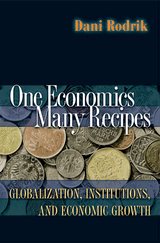One Economics, Many Recipes: Globalization, Institutions, and Economic Growth
Thursday, November 29, 2007 Open to IMF/World Bank Staff and the Public |
| View a webcast of this event Transcript of the Book Forum Summary of the Event |
Discussants:
Bob Davis (Wall Street Journal)
Arvind Subramanian (Peterson Institute for International Economics and Center for Global Development)
Roberto Zagha (World Bank)
In an important new book, Dani Rodrik shows that countries that grow and reduce poverty do so by following eclectic policies tailored to their own realities rather than by following a recipe of best practices cooked up by the international globalization establishment.
Nobel laureate George Akerlof says that Rodrik's new book "does for economic development what Julia Child does for French cooking.... Rodrik teaches economists and policy planners how to construct successful, sustainable development programs."
The book describes the varying recipes that successful countries such as China, India, Korea, Chile, Mauritius, and Botswana have crafted to attain economic growth—and what other countries can learn from their experiences.
Rodrik says further globalization should be combined with the provision of social insurance to help those who lose out: "it will take a lot of work to make globalization's rules friendlier to poor nations" and to those displaced by globalization within nations.
Dani Rodrik is a professor at Harvard University's Kennedy School of Government. He writes a popular blog (http://rodrik.typepad.com/) called "Unconventional thoughts on economic development and globalization." His views have been prominently featured in the Wall Street Journal and the New York Times, which wrote that Rodrik "has built a reputation among mainstream economists and policy makers for favoring eclectic solutions that mix government and the private sector in pragmatic ways." He was awarded the Social Science Research Council's inaugural Albert O. Hirschman prize this year.
Bob Davis is a Pulitzer-prize winning reporter at the Wall Street Journal; he was awarded the Pulitzer for international reporting in 1999 for chronicling Russia's financial crisis. He is the author, with David Wessel, of a 1998 book "Prosperity" which predicted broadly shared prosperity for the U.S. middle class over coming decades fueled by high technology, the reeducation of the American work force, and globalization. His recent WSJ articles include "IMF Fuels Critics of Globalization" (October 11, 2007), "Globalizationís Gains Come With a Price" (May 24, 2007), and "Pain from Free Trade Spurs Second Thoughts" (March 28, 2007).
Arvind Subramanian is senior fellow at the Peterson Institute for International Economics. He also holds a joint appointment at the Center for Global Development and is senior research professor at Johns Hopkins University. He worked at the International Monetary Fund from 1992 to 2007, most recently as assistant director in the Research Department. Subramanian has written on growth, trade, development, institutions, aid, oil, India, Africa, the World Trade Organization, and intellectual property.
Roberto Zagha is Senior Advisor in the World Bank Vice Presidency in charge of economic policies and poverty reduction strategies. His most recent work consisted of a review of the growth experience of the 1990s—a two year program whose results are summarized in three reports which review growth experiences, explore the current thinking on growth and the role of policies in growth strategies. Previous assignments in the Bank include Director for South Asia for the Bank department in charge of economic policies and poverty reduction in South Asia, Lead Economist for India, and several assignments in Central and East Africa, India, Sri Lanka, Argentina and Bolivia. He also was part of the core team for the World Development Report of 1991. Prior to joining the Bank, Roberto Zagha taught at the University of Sao Paulo, Brazil, and worked as senior economist in the Economic Research Institute associated with that university in areas related to taxation and fiscal policies. He is currently Secretary to the Commission on Growth and Development.
Please note that due to enhanced security arrangements:
1. An RSVP is required: EXRPOLICYCOM@imf.org or (202) 623 6360.
2. Guests should present a photo identification and use the IMF Center entrance at 720 19th St. N.W. Washington, DC (at the white tent). Only IMF/World Bank staff should enter through the main 700 19th St. entrance.


